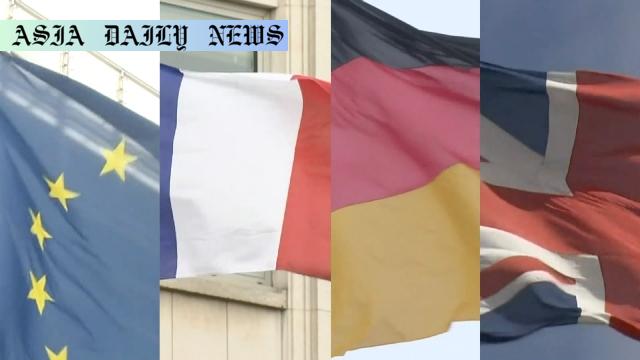Iran Nuclear Talks – The European Union and three European countries seek to persuade Iran to return to nuclear program discussions.

Renewing Diplomatic Efforts Between the EU and Iran
The European Union, along with France, Germany, and Britain, is focusing its efforts on persuading Iran to re-engage in nuclear negotiations. A meeting is planned in Geneva with Iranian Foreign Minister Abbas Araghchi, which aims to discuss the ongoing developments surrounding Iran’s nuclear program. This diplomatic initiative reflects growing concerns over escalating tensions in the region, particularly the exchanges of fire between Iran and Israel.
Regional stability remains a top priority for the EU and its allies as they navigate complex geopolitical dynamics. Iran has demonstrated ambivalence towards the prospect of the meeting. However, Abbas Araghchi’s statement on social media highlighting Tehran’s commitment to diplomacy provides a glimmer of hope that constructive dialogue could emerge. Stakeholders are aware of the potential implications on peace and stability in the Middle East if progress cannot be achieved through negotiations.
Rising Regional Tensions and Military Activities
Amid these diplomatic efforts, the backdrop of escalating military tensions cannot be ignored. Iran has continuously launched missiles at Israel, leading to retaliatory strikes targeting various strategic locations within Iran, including nuclear facilities. This cycle of aggression has compounded fears of broader regional conflict. Diplomatic talks, such as those facilitated by the EU, are seen as integral to de-escalating the situation and creating paths for long-term stability.
Adding to the complexity is the involvement of the United States, which has displayed readiness for both military action and high-level discussions with Iranian representatives. US President Donald Trump’s warnings of potential military operations further underscore the urgency for renewed diplomacy. Any advancement towards dialogue could serve as a stabilizing force amidst increasing regional instability and external pressures.
Prospects for Progress and the Role of the United States
While the EU remains committed to reviving discussions, the reaction from Iran remains uncertain. The US, under the Trump administration, expressed interest in high-level talks, conditional on Iran abandoning its uranium enrichment program. If Tehran opts to engage, this could pave the way for broader international cooperation aimed at easing tensions and restricting Iran’s nuclear ambitions.
The global community is closely monitoring these developments. The outcome of the Geneva talks could prove pivotal to determining whether diplomacy can prevail over military escalation. With significant stakes for regional and global stability, stakeholders must navigate these negotiations carefully, balancing the need for security with avenues for dialogue.
Potential Path Forward
As the world watches, the EU’s ability to bring Iran back to the negotiating table will serve as a testament to the power of diplomacy amidst conflict. Regional challenges and international pressures only complicate the process. However, the collective voices of France, Germany, and Britain, alongside the EU, present a strong front willing to prioritize peace and stability.
The hope lies in Iran’s acknowledgment of diplomacy as a viable solution to resolving its disputes with the international community. Should Tehran choose diplomacy, a path forward could be carved out that benefits not only Iran and its immediate neighbors but also global security and nonproliferation goals.
Commentary
The Importance of Reviving the Iran Nuclear Talks
Revitalizing dialogues between the EU and Iran is a critical step towards ensuring geopolitical stability in a volatile region. The decision of three significant European powers—France, Germany, and the UK—to join forces with the EU reflects the urgency of preventing further escalation arising from Iran’s nuclear ambitions and military confrontations. As history has repeatedly shown, diplomacy often presents the best avenue to mitigate conflicts and address underlying tensions.
The Complexity of Balancing Interests
One of the significant challenges in re-engaging Iran lies in balancing the interests of various stakeholders. For Iran, its nuclear program is closely tied to both its national pride and its strategic leverage. On the other side, Western powers prioritize curbing nuclear proliferation and securing the safety of allied nations, particularly Israel. Navigating this sea of divergent priorities is no small feat, but it is essential for preventing further regional instability.
The Role of International Dialogue Amid Escalation
The backdrop of intensified hostilities between Iran and Israel adds another layer of complexity to the equation. Military exchanges threaten to derail any diplomatic progress before it begins. The EU’s proactive role in facilitating discussions with Tehran demonstrates an effort to shield these talks from external disruptions. However, a more united international approach, possibly involving the United States, is crucial to achieving meaningful progress.
Opportunities for Long-Term Peace
While the situation remains tense, opportunities for long-term peace should not be overlooked. The EU’s commendable efforts in calling for renewed dialogue provide a vital platform for addressing nuclear concerns. Adding pressure, the US’s willingness to initiate high-level talks signals the possibility of aligning Western interests with Iran’s desire for engagement. The international community must seize this moment of potential collaboration to chart a productive path forward.


